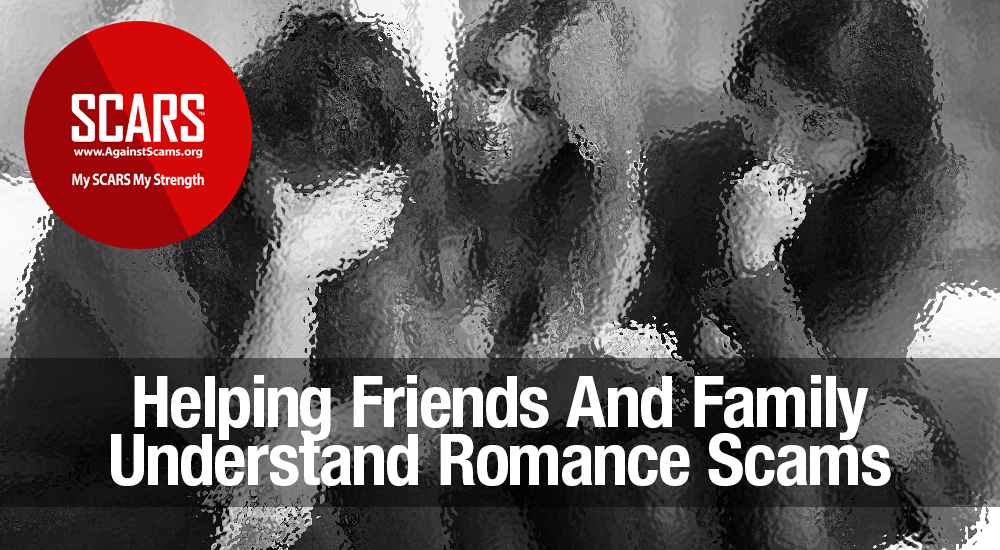
SCARS Institute’s Encyclopedia of Scams™ Published Continuously for 25 Years

After A Scam Ends All Victims Need Validation!
Scam victims are disoriented, desperate, and unsure of everything. They need help to validate that they are the victim of a crime!
How To Help Them
The following will help friends and family members help victims by validating them!
This information can reassure survivors that you believe them and support them
Whether it’s your best friend, your sibling, a coworker, or a complete stranger who tells their story on the internet, hearing that someone is enduring or has endured A RELATIONSHIP SCAM is never easy. But trust that for a survivor to break his or her silence and disclose that online abuse/violation is even tougher.
Even though relationship scams (romance scams & pig butchering scams, and others) are a worldwide epidemic — millions of individuals have or are experiencing this abuse from an online trusted person (a criminal)—there are still cultural stigmas and misconceptions that stand in the way of scam survivors being heard, believed or helped.
This is what it means to be Validated!
Survivors Face Judgment
Status discrimination, for one, means that victims of online financial fraud are often stereotyped as being of a certain class, or from a certain income or education level. Such as: all scam victims are old and lonely, young and greedy, or just needy. That old, “That sort of thing can’t happen here, to me,” excuse is a person’s way of thinking they’re protected from these crimes when in fact, scam victims come from all walks of life, all income levels, all geographical areas (worldwide, even in Nigeria), all types of professions, all sorts of family backgrounds, all ages, all levels of intelligence. In fact, everyone can be scammed, and everyone will be scammed.
A Victim
The word victim itself can trap someone in the role of believing that they are passive, helpless, or weak. Many people, understandably, don’t want to label themselves as victims or be called victims. This is how the term “survivor” came to be the preferred term to describe someone who has endured these cases of fraud.
And then there is that belief by some, carried over from decades past, that these crimes are the victim’s fault, they should have somehow known better than to trust a stranger and send them money. This idea lays some/most of the blame for online/phone/email scams on the survivor, as though he or she has somehow played a part in the crime occurring. Even the police are sometimes guilty of believing this outdated idea. The whole blame is on the criminals that did this! No one else!
Let us be crystal clear, the only mistake a survivor made was in first saying hello! After that, the criminal’s expert grooming, manipulation, and control took over!
Between these stigmas and the widespread victim-shaming that occurs on a regular basis, it’s no wonder survivors have a hard time stepping forward and speaking out when they experience this violation of their trust.
That’s why it’s up to those in their support circle: the mental healthcare professionals, victims’ assistance providers, advocates, their concerned friends and family members, and even law enforcement — to validate and believe survivors when we hear about these crimes.
Validate with Your Word
When someone comes forward with a confession of being a survivor of one of these crimes, or even lightly dances around the topic, perhaps afraid to fully admit what’s happened or happening to them, but still scared enough that it needs to be hinted at, it’s vital to listen. Actively listen, without judgment and blame! You could be that person’s only trusted lifeline.
Here are important responses you can give that show you believe in and support them. Sometimes, it’s important to say them all:
- “This is not your fault.”
- “Many other people are scammed by these criminals. You are not alone.”
- “You’re not alone. I’m here for you. Thank you for telling me.”
- “I’m so sorry those criminals did this to you.”
- “I believe you. This is a crime”
- “Nothing you did caused this. Crime is a choice these criminals made. You were just their target”
- “No one has the right to hurt you, no matter how greedy they are.”
- “You aren’t being dramatic. You have every right to feel what you feel.”
- “Your emotions are valid.”
- “There’s a way out of this. I can help you find resources.”
- “You are worthy and deserving of a safe and healthy life.”
After validating someone’s experience, you can refer them to resources to help them better understand these crimes and to show them there’s a safe way out. Start by encouraging them to talk to a trained professional such as SCARS, as well as a trauma counselor — you can find one near you or through the SCARS partner BetterHelp.com or through these:
- www.opencounseling.com
- www.psychologytoday.com/us/therapists/trauma-and-ptsd
- www.nbcc.org/Search/CounselorFind
- www.talkspace.com
SCARS is here to Help!
We offer a free program for survivors to interact with other survivors in a safe environment through our online support & recovery groups. To learn more and apply visit support.AgainstScams.org
We also help to get survivors started with professional counseling through our SCARS Gold Membership. For just $15 survivors receive many benefits, including a full month of counseling or therapy free! To learn more about our Gold Membership visit membership.AgainstScams.org and to join now go to join.AgainstScams.org
We hear Scam Survivors – We Understand Scam Survivors
We can help survivors turn away from the destructive reactions that most victims experience and start on the path to recovery! This is what we do.
Also, remember that friends and family members can be strongly affected by seeing a friend or family member go through this. We offer a support group exclusively for friends and family members as well.
Learn what we do and how we can help!
To really learn the truth about scams also read the articles on the Psychology of Scams and Victim Recovery here on www.RomanceScamsNOW.com You will also find more information for family and friends of scam survivors here!
We are here to Help!
We are SCARS – the Society of Citzens Against Relationship Scams Inc. a government-partnered online crime victims’ assistance and crime prevention nonprofit organization supporting scam survivors worldwide!
-/ 30 /-
What do you think about this?
Please share your thoughts in a comment below!
Table of Contents
LEAVE A COMMENT?
Thank you for your comment. You may receive an email to follow up. We never share your data with marketers.
Recent Comments
On Other Articles
- on Love Bombing And How Romance Scam Victims Are Forced To Feel: “I was love bombed to the point that I would do just about anything for the scammer(s). I was told…” Feb 11, 14:24
- on Dani Daniels (Kira Lee Orsag): Another Scammer’s Favorite: “You provide a valuable service! I wish more people knew about it!” Feb 10, 15:05
- on Danielle Delaunay/Danielle Genevieve – Stolen Identity/Stolen Photos – Impersonation Victim UPDATED 2024: “We highly recommend that you simply turn away form the scam and scammers, and focus on the development of a…” Feb 4, 19:47
- on The Art Of Deception: The Fundamental Principals Of Successful Deceptions – 2024: “I experienced many of the deceptive tactics that romance scammers use. I was told various stories of hardship and why…” Feb 4, 15:27
- on Danielle Delaunay/Danielle Genevieve – Stolen Identity/Stolen Photos – Impersonation Victim UPDATED 2024: “Yes, I’m in that exact situation also. “Danielle” has seriously scammed me for 3 years now. “She” (he) doesn’t know…” Feb 4, 14:58
- on An Essay on Justice and Money Recovery – 2026: “you are so right I accidentally clicked on online justice I signed an agreement for 12k upfront but cd only…” Feb 3, 08:16
- on The SCARS Institute Top 50 Celebrity Impersonation Scams – 2025: “Quora has had visits from scammers pretending to be Keanu Reeves and Paul McCartney in 2025 and 2026.” Jan 27, 17:45
- on Scam Victims Should Limit Their Exposure To Scam News & Scammer Photos: “I used to look at scammers photos all the time; however, I don’t feel the need to do it anymore.…” Jan 26, 23:19
- on After A Scam, No One Can Tell You How You Will React: “This article was very informative, my scams happened 5 years ago; however, l do remember several of those emotions and/or…” Jan 23, 17:17
- on Situational Awareness and How Trauma Makes Scam Victims Less Safe – 2024: “I need to be more observant and I am practicing situational awareness. I’m saving this article to remind me of…” Jan 21, 22:55
ARTICLE META
Important Information for New Scam Victims
- Please visit www.ScamVictimsSupport.org – a SCARS Website for New Scam Victims & Sextortion Victims
- Enroll in FREE SCARS Scam Survivor’s School now at www.SCARSeducation.org
- Please visit www.ScamPsychology.org – to more fully understand the psychological concepts involved in scams and scam victim recovery
If you are looking for local trauma counselors please visit counseling.AgainstScams.org or join SCARS for our counseling/therapy benefit: membership.AgainstScams.org
If you need to speak with someone now, you can dial 988 or find phone numbers for crisis hotlines all around the world here: www.opencounseling.com/suicide-hotlines
A Note About Labeling!
We often use the term ‘scam victim’ in our articles, but this is a convenience to help those searching for information in search engines like Google. It is just a convenience and has no deeper meaning. If you have come through such an experience, YOU are a Survivor! It was not your fault. You are not alone! Axios!
A Question of Trust
At the SCARS Institute, we invite you to do your own research on the topics we speak about and publish, Our team investigates the subject being discussed, especially when it comes to understanding the scam victims-survivors experience. You can do Google searches but in many cases, you will have to wade through scientific papers and studies. However, remember that biases and perspectives matter and influence the outcome. Regardless, we encourage you to explore these topics as thoroughly as you can for your own awareness.
Statement About Victim Blaming
SCARS Institute articles examine different aspects of the scam victim experience, as well as those who may have been secondary victims. This work focuses on understanding victimization through the science of victimology, including common psychological and behavioral responses. The purpose is to help victims and survivors understand why these crimes occurred, reduce shame and self-blame, strengthen recovery programs and victim opportunities, and lower the risk of future victimization.
At times, these discussions may sound uncomfortable, overwhelming, or may be mistaken for blame. They are not. Scam victims are never blamed. Our goal is to explain the mechanisms of deception and the human responses that scammers exploit, and the processes that occur after the scam ends, so victims can better understand what happened to them and why it felt convincing at the time, and what the path looks like going forward.
Articles that address the psychology, neurology, physiology, and other characteristics of scams and the victim experience recognize that all people share cognitive and emotional traits that can be manipulated under the right conditions. These characteristics are not flaws. They are normal human functions that criminals deliberately exploit. Victims typically have little awareness of these mechanisms while a scam is unfolding and a very limited ability to control them. Awareness often comes only after the harm has occurred.
By explaining these processes, these articles help victims make sense of their experiences, understand common post-scam reactions, and identify ways to protect themselves moving forward. This knowledge supports recovery by replacing confusion and self-blame with clarity, context, and self-compassion.
Additional educational material on these topics is available at ScamPsychology.org – ScamsNOW.com and other SCARS Institute websites.
Psychology Disclaimer:
All articles about psychology and the human brain on this website are for information & education only
The information provided in this article is intended for educational and self-help purposes only and should not be construed as a substitute for professional therapy or counseling.
While any self-help techniques outlined herein may be beneficial for scam victims seeking to recover from their experience and move towards recovery, it is important to consult with a qualified mental health professional before initiating any course of action. Each individual’s experience and needs are unique, and what works for one person may not be suitable for another.
Additionally, any approach may not be appropriate for individuals with certain pre-existing mental health conditions or trauma histories. It is advisable to seek guidance from a licensed therapist or counselor who can provide personalized support, guidance, and treatment tailored to your specific needs.
If you are experiencing significant distress or emotional difficulties related to a scam or other traumatic event, please consult your doctor or mental health provider for appropriate care and support.
Also read our SCARS Institute Statement about Professional Care for Scam Victims – click here to go to our ScamsNOW.com website.
















Most investment brokers are scams. Deposits are easy, but withdrawals are impossible. I’ve been trying to recover my funds for over a week, but my requests are consistently denied. The financial manager turned hostile and abusive when I wouldn’t comply. Don’t trust them, they give out fake trading signals and request to deposit more. I had to seek help for a legal means.
I also stumbled upon SCARS, when I was scrolling on Quora. I never dreamed that a free program would be so extensive, informative, supportive and essential to my healing. I’m forever grateful to all involved. I only wish I’d found you sooner. Thank you for all you do.
I too may not have found SCARS and I am so glad that I did. I might still be sitting in shame, possibly even going through a separation or divorce. The education offered by SCARS for free is the best gift I’ve ever experienced. Thank you for all you do and provide.
This article was insightful. I wish that my best friend of over 20 years would have reacted in empathy and support instead of judging me and stereotyping me. This made me feel worthless and sent me into a deep despair for well over a week. I thought to myself if a best friend can think this of me, then how is my family going to react? I have removed my trust of this person and I spend little time with her now. She has not brought it up but I feel sure she wonders why we’re not close now. I have not informed my family – only my husband knows. He reacted positively and is very supportive.
SSS TES
SCARS should really have more exposure. Fortunately I found them by chance. It’s rare to find a resource for free professional help with anything. SCARS deserves a lot of credit for the help and guidance they provide.